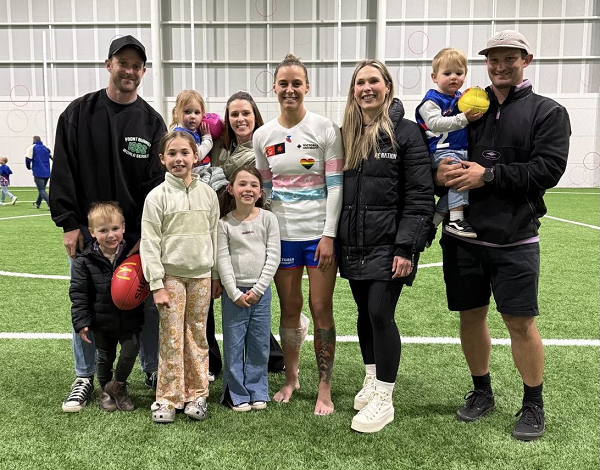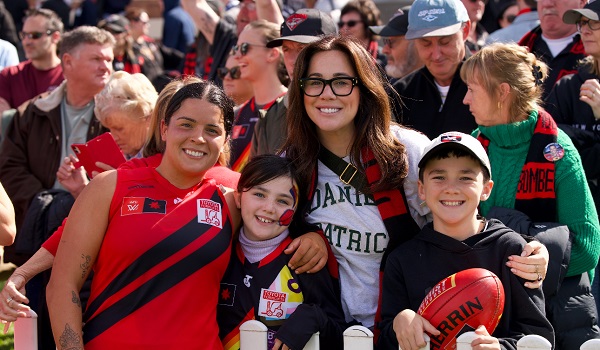AFLW Essendon midfielder Maddy Prespakis and Western Bulldogs’ captain Deanna Berry have each had to develop a fair bit of resilience to get to where they are today.
Deanna has experienced gruelling injuries, trades, and took on a coaching role with a men’s team at a young age; Maddy has spoken candidly about working through body image issues and the impacts of negative social media.
Batting away self-doubt and keeping your confidence on track can be a tough ask, especially as a female athlete.
“I think there was definitely a lot of self-doubt when I was younger,” says Deanna.
“When I played my first season at Melbourne and then got traded across to the Western Bulldogs, that year after was quite a tough year for me,” she says.
“I just couldn't play my best footy because I was feeling that self-doubt.”
Maddy, too, knows the impact self-doubt can have, especially on women.
“I think women struggle the most when it comes to confidence – I know that a lot of athletes do,” she says.
“You’ve got to learn to love yourself – I've had to learn to love what I look like and be happy with that.”
Even when you’re at the top of your game, self-doubt can bubble up – and can be a tricky feeling to shake.
Performance psychologist Kelly Doherty works with umpires in the AFLW, who often want to improve their confidence.
“Athletes, in general, tend to be high achieving individuals and hold high self-expectations, which can lend to athletes being quite self-critical,” she says.
“They have a lot of belief in what they can achieve; however, that also means that when their performance is not going as well, doubt can really creep in and that can get the better of them.”
She says the term “imposter syndrome” has come up in her sessions, as a persistent issue that people want to overcome.
So, when self-doubt strikes – whether it’s on the footy field, at school or in your workplace – is there anything you can do about it?
What is imposter syndrome?
Put simply, imposter syndrome is the sensation of feeling like a fraud or that any success you’re experiencing is undeserved.
Kelly says these feelings aren’t reflective how we’re actually performing or appearing to the outside world – and can impact high-achieving people.
“I've had umpires in the past two seasons directly name it themselves as ‘imposter syndrome’,” she says.
“They feel like their achievements and successes have been from other external factors, rather than their own success or their own hard work and doing – particularly female umpires.”

How to overcome imposter syndrome and self-doubt
If you’re struggling with feelings of self-doubt – on or off the sporting field – how can you change your thinking? Here are some tips from the pros.
Think about your why
Maddy says a big one for her is to return to “your why” – the reason you want to be doing what you’re doing in the first place.
“Come back to the reason why you play, or why you're taking to the field in whatever sport or code you're doing – it’s because you have fun,” she says.
“That's what I remind myself – why I do it. And I've always loved doing it.”
Speak about your feelings
Deanna says a game-changer for her has been talking through her feelings.
“It wasn't until two or three years ago that I probably matured a little bit more, sought some help, and spoke in depth with my mentors and people around me, to help me understand why I wasn't feeling the confidence, especially on the footy field,” she says.
“I look back and that set me up really well; although it was really hard – I wasn't playing well, I wasn't training well, I was probably doubting everything that I was doing – now I have some good resilience on the back of that to help others.”
Celebrate your wins in a ‘boast book’
Kelly suggests keeping a log of things you’re proud of – whether in a notebook or the notes app on your phone – and referring to it when you need a boost.
“Bring in some evidence of something that you’ve done really well, or experiences that you've had where you’ve been proud of yourself,” she suggests.
“I do this with [clients] by encouraging them to write it down, personally celebrate successes to help build self-belief.”
Draw on support of people around you
Maddy and Deanna both say it’s important to think about whose opinion matters and tune out the noise.
“Just take whose opinion matters to you most,” says Maddy.
“What your coaches tell you, what your good mates tell you – that's the kind of the people you listen to; you're not going to listen to Joe Blow that doesn't even know who you are.”
Remember some cue words
If you’re feeling very self-critical, Kelly says it can be helpful to acknowledge those feelings – then challenge them.
“When I work with athletes, we use cue words that you can draw on if you're noticing you’re becoming more critical of yourself or doubting yourself,” she says.
“These are based around encouragement, perspective and evidence of success.”
“An encouragement sentence might be, ‘Oh, you got this; you can do it.’
To help people gain perspective, she suggests they try to enjoy the experience as well as thinking about how far they’ve come.
“For a lot of the umpires I work with, [I say,] remember when you were a younger umpire – that little you would be really proud of you right now here umpiring AFLW.”
Will self-doubt ever go away?
It can be tough to change our internal dialogue – especially if we’re used to thinking in a self-critical way. But, Kelly says, it’s definitely something that can be improved – and she’s seen it happen.
A boundary umpire she was working with identified “imposter syndrome” as negatively impacting their performance; Kelly found they were often seeking external reassurance to know they were doing a good job.
“We changed that to come from an internal perspective; to gather evidence for themselves around, ‘What shows me that I do belong here?’” she says.
“When they talk now, I can hear that there's a bit more kindness in there – it's hard to quantify, but you notice it.”
If you’re struggling with self-doubt or negative thinking, there is help available:
- Medibank members with health insurance can access the 24/7 Medibank Mental Health Support service. Call 1800 644 325 or visit the website to chat to a mental health professional2 about how you feel and get guidance on what to do next at no extra cost1.
- Visit Head to Health or call 1800 595 212 for mental health advice and guidance
- Visit The Butterfly Foundation or call 1800 33 4673 for information and support for body image issues.
1 Some referred services may involve out of pocket costs and waiting periods may apply.
2 This service is being delivered by Amplar Health. Amplar Health is a business of Medibank Health Solutions Pty Limited (ABN 99 078 934 791), a member of the Medibank group of companies.

Medibank. Superfans of the AFLW.
Everybody deserves the chance to reach their full potential. That’s why we’ve joined forces with the AFLW as an Official Health Partner, to help tackle the health barriers facing women in sport.
